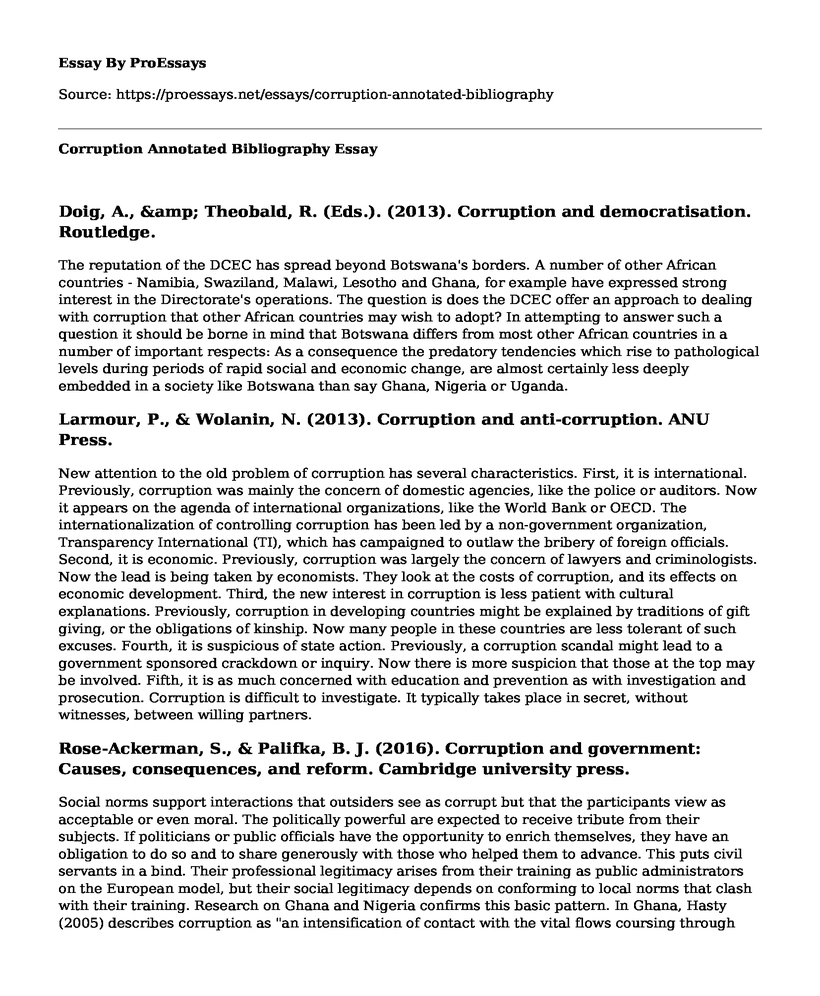Doig, A., & Theobald, R. (Eds.). (2013). Corruption and democratisation. Routledge.
The reputation of the DCEC has spread beyond Botswana's borders. A number of other African countries - Namibia, Swaziland, Malawi, Lesotho and Ghana, for example have expressed strong interest in the Directorate's operations. The question is does the DCEC offer an approach to dealing with corruption that other African countries may wish to adopt? In attempting to answer such a question it should be borne in mind that Botswana differs from most other African countries in a number of important respects: As a consequence the predatory tendencies which rise to pathological levels during periods of rapid social and economic change, are almost certainly less deeply embedded in a society like Botswana than say Ghana, Nigeria or Uganda.
Larmour, P., & Wolanin, N. (2013). Corruption and anti-corruption. ANU Press.
New attention to the old problem of corruption has several characteristics. First, it is international. Previously, corruption was mainly the concern of domestic agencies, like the police or auditors. Now it appears on the agenda of international organizations, like the World Bank or OECD. The internationalization of controlling corruption has been led by a non-government organization, Transparency International (TI), which has campaigned to outlaw the bribery of foreign officials. Second, it is economic. Previously, corruption was largely the concern of lawyers and criminologists. Now the lead is being taken by economists. They look at the costs of corruption, and its effects on economic development. Third, the new interest in corruption is less patient with cultural explanations. Previously, corruption in developing countries might be explained by traditions of gift giving, or the obligations of kinship. Now many people in these countries are less tolerant of such excuses. Fourth, it is suspicious of state action. Previously, a corruption scandal might lead to a government sponsored crackdown or inquiry. Now there is more suspicion that those at the top may be involved. Fifth, it is as much concerned with education and prevention as with investigation and prosecution. Corruption is difficult to investigate. It typically takes place in secret, without witnesses, between willing partners.
Rose-Ackerman, S., & Palifka, B. J. (2016). Corruption and government: Causes, consequences, and reform. Cambridge university press.
Social norms support interactions that outsiders see as corrupt but that the participants view as acceptable or even moral. The politically powerful are expected to receive tribute from their subjects. If politicians or public officials have the opportunity to enrich themselves, they have an obligation to do so and to share generously with those who helped them to advance. This puts civil servants in a bind. Their professional legitimacy arises from their training as public administrators on the European model, but their social legitimacy depends on conforming to local norms that clash with their training. Research on Ghana and Nigeria confirms this basic pattern. In Ghana, Hasty (2005) describes corruption as "an intensification of contact with the vital flows coursing through the political body" and she notes the prevalence of metaphors of eating and of the flow of blood to describe the practice. Corruption is not seen as the impersonal market invading the state but rather as hyperengagement in already existing sociopolitical flows. In Nigeria, Smith (2001) finds corruption embedded in "everyday instances of patronage" that are related to networks of kin, community, and other interpersonal associations. Corruption that helps one's friends and kin "can look like moral behavior from local perspectives."
Cite this page
Corruption Annotated Bibliography. (2022, May 17). Retrieved from https://proessays.net/essays/corruption-annotated-bibliography
If you are the original author of this essay and no longer wish to have it published on the ProEssays website, please click below to request its removal:
- A Comparative Study of Education Paper Example
- Essay Sample on the Theory of Competitive Advantage
- Research Paper on The Challenges Facing the Social Housing Sector
- Essay on Honoring the Efforts of All Involved for Accessible Toronto Libraries
- Essay on Understanding Racial Disparity in the US: Examining Conley's 'Being Black, Living in the Red'
- Essay Example on Rise in Military Spending: US Dominates, China Follows
- Essay Example on the Role of Government: Protecting & Sustaining Citizens







